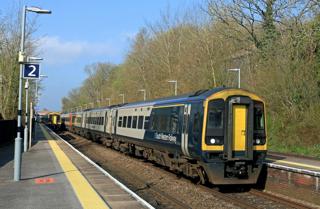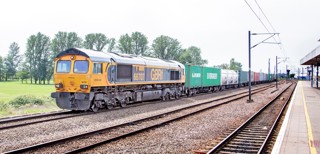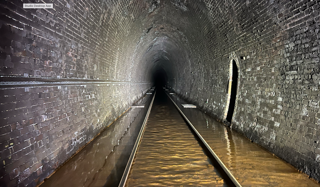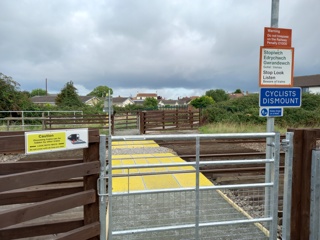On June 13, the Department for Transport welcomed “our” inter-city train to London Paddington ahead of its naming by Her Majesty The Queen. Not Great Western Railway’s train. Not Hitachi Rail Europe’s train. No, the Government claimed the Intercity Express Programme Class 800 as ‘theirs’.
It was tweeted as the newly reappointed Secretary of State for Transport Chris Grayling stood watching the train’s arrival. He was accompanied by Network Rail Chief Executive Mark Carne and Western Route Managing Director Mark Langman, as they waited to greet the train’s distinguished passenger.
This was less than 48 hours after Grayling had been confirmed as retaining his position as Transport Secretary, following June 8’s General Election. As this issue of RAIL went to press, negotiations between the Conservatives and the Democratic Unionist Party were ongoing regarding the formation of a Government, while Labour leader Jeremy Corbyn told the House of Commons on June 13 that his party was waiting to lead the country if an agreement could not be reached.
Should Corbyn’s wish be fulfilled, nationalising the UK’s railways again becomes an issue. In the meantime, the Government is stating that a new train for GWR is its own. No wonder there is confusion in most quarters regarding public ownership.
What Labour wants to do is take the passenger operators into public ownership. No sooner had Grayling been reappointed than Shadow Transport Secretary Andy McDonald was tweeting that the railways need to be renationalised - he quoted research published in The Times stating that the private railway could have cost £51 billion more to operate than if British Rail had remained in state hands (see pages 8-9). That figure represents a best-case scenario of BR reducing its costs by 2% per year from 1997-98, had unit costs remained stable at 1993-94 levels.
However, the authors of the paper - John Stittle of Essex University and Sean McCartney of the University of London - also concluded that if passenger growth had been matched, the cost of the privatised railway (per year) would have been less each year from 2011-12 to 2013-14. In the last year studied, BR’s hypothetical costs are estimated at £10.2bn, while the current passenger railway was £9.3bn.
At this point, it’s worth flicking through the RAIL archives to remind ourselves of what BR was like, certainly in its dying days.
In August 1992, it was announced that 270 jobs would go as BR closed Selhurst’s Level 5 maintenance facility. Less than four months later, it announced 5,000 further job losses over four months, due to a recession.
Fast forward to today, and we live in an age of uncertainty caused first by Brexit and now by the inconclusive General Election result. There is concern over what the impact of both could be - the latter is already affecting the possible redevelopment of railways serving parts of London, as the financial forecasts cannot be accurately predicted until we as a nation know for certain what is happening.
And yet, for the first time, the passenger railway is paying for itself. Since 1997-98 train operating company costs per passenger have declined by 26%, to 26p. In 1997-98 the railway ran at a £2bn a year loss in terms of its day-to-day costs. In 2014-15 it covered those costs with £200 million spare.
Rail Delivery Group Chairman Chris Burchell suggests that rail could be the “economic anchor” for the country, with 24,000 jobs created by the industry in the next two years, followed by up to 100,000 over the next decade. These new positions are largely in skilled high-value areas such as engineering and construction. They will support new projects and new trains.
In the next five years alone, around £10bn worth of new trains will be delivered. This equates to more than 5,000 new vehicles, which will be used to transport record passenger numbers upwards of 1.7 billion. This is up from 800 million in the final days of BR. Growth may have slowed, but it is still there.
There is little in the way of details when it comes to Corbyn’s plans, beyond what appears to be an ideology. The claims from unions that the franchises are in the hands of European state railways may be largely true, but they do not mention that UK firms are winning deals abroad, or that the UK supply chain is actively targeting foreign contracts. It’s bad for foreign companies to invest in the UK, but not for the reverse - it seems.
Likewise, unions want public ownership and management of the railways. Yet they are at loggerheads with Southern, which is a management concession effectively controlled by Government. And the troubles affecting that operator are spreading - on Merseyside, a Labour authority ordered new trains that will be publicly funded, but which will have no guards. Hence another dispute with the RMT.
This is not to say that the current set-up of the UK railways is perfect - we all know it isn’t. Costs clearly need to be reined in, projects need better management (certainly the major ones such as Great Western electrification), and the money that drains from the industry would be better spent on improving services.
When a railway reopening where 96% of the trackbed is still in place (south of Tweedbank on the Borders line) costs more than £600m, or when reopening an eight-mile branch line (Wisbech) is quoted at £150m by consultants, clearly a detailed examination is required into where that money is going, why this is happening and how the issue can be addressed.
Likewise the cost of projects. The DfT’s IEP trains will run on a system not yet fully electrified, with the project having no official completion date. The IEPs, specified by Government to run on a railway being electrified by state-controlled Network Rail, cost £5.7bn for 866 vehicles. The Great Western electrification was budgeted at £800m initially, but latest figures suggest £2.8bn with that number likely to rise still further. This is the kind of ammunition required by those opposed to the current system, and which those who support the present way of working need to address… fast.
On the same day as HM The Queen was naming the IEP at Paddington, further south there were celebrations as trains ran from Swanage to Wareham for the first time in 45 years (see page 22-23). The Dorset town is now officially reconnected to the national network on a regular basis. After I tweeted the news, one person replied that it was great news and that if the railways were nationalised then more of this would happen. Remind me: in 1972, who operated a railway and felt the need to close lines? That’s right - BR!
The current privatisation model may be broken and in need of surgery, but the remedy is collaboration led by a single ‘guiding mind’ such as the Strategic Rail Authority, not renationalisation. Rail needs to look to the future, not the past.
Comment: RAIL 829: June 21 - July 4 2017

















Login to comment
Comments
No comments have been made yet.